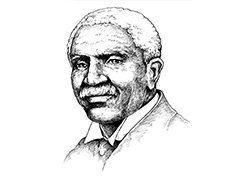Take One and Pass It Down: Antacids for the Ocean
If you’ve ever found yourself reaching for an antacid after an indulgent round of feasting, you’re in good company—the ocean is taking antacids, too!
Our stomachs produce acid to digest all the food we eat. Sometimes, foods can cause acid to leak into the esophagus, creating the sensation we associate with heartburn. Antacids are chemically basic compounds, and taking one helps to neutralize stomach acid, reducing its ability to irritate our esophagus. Scientists looking to reduce the acidity of the ocean—and in tandem counteract climate change—are applying the same strategy!
The ocean absorbs carbon dioxide (CO2) from the air and turns it into small chemical compounds known as bicarbonate, which can stay in the ocean for thousands of years. The CO2 and water from the ocean react to make a weak acid that releases hydrogen ions. More hydrogen ions means stronger acidity. This is a natural process that’s been around longer than humans, but with more CO2 in our air because of climate change, the ocean is absorbing more carbon, making more hydrogen ions and becoming more acidic.
You wouldn’t feel this change when you swim in the ocean, but marine life sure does! The extra acid in the ocean begins to slowly dissolve the shells and skeletons of many sea organisms, damaging their populations. If ocean acidity continues to rise through this century, the ocean might become more acidic than it has been in the past 20 million years. This is the ocean’s version of heartburn, so let’s get it an antacid!
Scientists have already introduced tons of basic alkaline chemicals into the ocean to test this solution. By raising the ocean water’s pH and triggering carbon dioxide-capturing reactions, we can take a natural process in the ocean and speed it up to absorb the human-made CO2 in our atmosphere.
Acids and bases are a fundamental chemistry concept that is well understood and predictable. When it comes to protecting ecosystems from global warming, many people are excited by this reliable solution with relatively few variables to control.
The next time you take an antacid, remember that somewhere out there the ocean is taking one, too. Chew on that!


